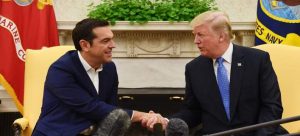Now that Trump is President, Tsipras finds himself among the club of world leaders hoping to paper over their election-year criticisms of the billionaire businessman, who is known to carry a grudge and remember even the smallest slight.
Speaking in the Rose Garden after their meeting, Tsipras downplayed his election-year remarks, insisting he’s ready now to partner with Trump.
“We have common values,” Tsipras said through a translator during a Rose Garden news conference. “Don’t forget that the value of democracy and freedom was born in Greece. It’s one of the values that traverses American culture and American tradition. The President now continues that tradition.”
“I think our collaboration will be very substantial,” he said. “And I’m very optimistic after the meeting we had today.”
Trump — who seemed unaware of the “evil” comments before they were raised by a reporter — appeared unsurprised, noting many world leaders were apprehensive after his victory.
“A lot of countries were very nervous at the beginning, and I have very good relationships with the leaders of virtually every country I have dealt with,” he said. “The reason they were concerned is because I will not allow our country, the United States of America, to be taken advantage of by so many other countries all over the world.”
During a speech in March 2016, the prime minister expressed disbelief that Trump could even be elevated as the status-bearer of the Republican party.
“Tell me who of you would believe a few months ago that in the US today, the front-runner on behalf of the Republicans for the nomination of the candidate President would be Mr. Trump?” Tsipras asked. “And, of course, what this nomination marks, the ideas it represents, the appeal it reaches and the threat to become even President — I hope we will not face this evil.”
In Tsipras, Trump found a socialist leader whose country has relied on international financial support for years in the face of a crippling debt crisis — a scenario that squares poorly with Trump’s stated views that countries should bear responsibility for their own affairs.
But with the US embroiled in an
increasingly bitter standoff with Turkey, Trump has identified a willing security partner in Athens at a moment of deep regional instability. And despite its financial woes, Greece is one of the few NATO members that meets the alliance’s defense spending threshold — an issue Trump has litigated vociferously.
Trump offered praise for the country’s NATO commitments on Monday, and said he supported a “responsible debt relief plan.”
“I think it has a great role in stability in the area,” Trump said. “We have a feeling that it will get stronger and stronger … once it gets over this tremendous financial hurdle that it’s in the process of working out, we think that there will be great stability in Greece. And militarily, and in every way we look at it, as very important and very important to the United States.”
The White House said ahead of the visit that Trump and Tsipras would discuss defense and economic issues, as well as energy security and the cultural ties between Americans and Greeks.
Tsipras was first elected in 2015 on a wave of anti-austerity sentiment after years of harsh reforms enforced by Greece’s bankrollers in Europe. At 40, he came into office as one of the world’s youngest leaders and — as a former communist — one of its most left-leaning.
Since he took office, Greece’s financial situation has stabilized somewhat, and the violent protests that erupted periodically during the long periods of enforced hardships subsided.
The return to relative financial stability coincided with increasing instability in Turkey, Greece’s neighbor across the Aegean Sea, where President Recep Tayyip Erdoğan has taken controversial steps to consolidate power while deepening rifts with Washington. Last week, a
US consular staff member was arrested in Istanbul, which prompted the US to freeze non-immigrant visa services.
Tsipras has viewed the diplomatic crisis as an opening to further warm ties with the US, even if his partner is a political opposite. He said Tuesday that despite his country’s conflicts with Turkey, he believes that the country should “remain within NATO and (on) its European course.”
“My answer to your question is yes, we do believe Turkey must remain within NATO and its European course,” Tsipras said, adding that “the road to Europe … and collaborations with the West carries with it certain conditions, certain responsibilities.”
Those conditions, Tsipras said, include respecting international law, collaborating with other NATO countries and not promoting tension in the region.
During his trip to the US, Tsipras was also due to talk with Christine Lagarde, head of the International Monetary Fund, to discuss the body’s protracted involvement in Greece’s finances. Tsipras is also set to gauge Trump’s stance on the matter, which has plagued the country for years.
During remarks in March, Trump praised the Greek-American community during a celebration of Greece’s independence day.
“I love the Greeks. Oh, do I love the Greeks,” he said in the White House East Room. “Don’t forget, I come from New York. That’s all I see, is Greeks. They are all over the place.”
He also praised his then-chief of staff Reince Priebus, a Greek-American, who he’d once joked he would name his ambassador to Athens. Priebus was replaced as chief of staff in July, and Trump has so far kept his predecessor Obama’s pick in the ambassador post.
http://edition.cnn.com/2017/10/17/politics/president-donald-trump-alexis-tsipras-greece-evil/index.html





